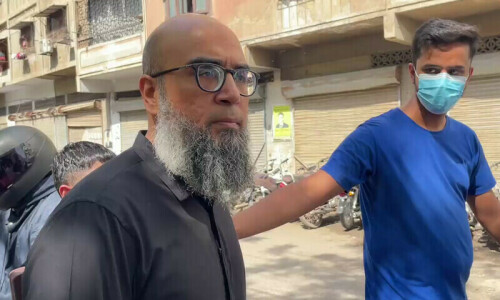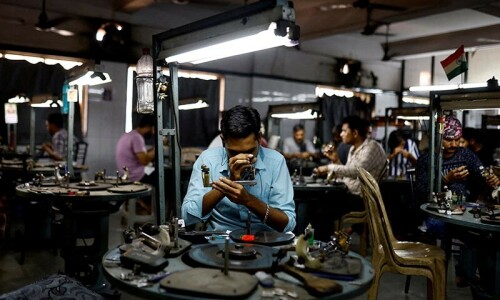ISLAMABAD/QUETTA: Just two days before the start of the nationwide polio campaign, apart from Karachi where it has been preponed by one week, the National Institute of Health (NIH) has confirmed five more polio cases from Khyber Pakhtunkhwa (KP) and Balochistan.
Due to inclusion of the latest cases, the tally for current year has reached 17, while 144 cases were reported in 2019, 12 in 2018 and only eight cases in 2017.
As per the current year’s data, 10 cases have been reported from KP, five from Sindh and two from Balochistan.
“Four (latest) cases from KP have been reported from Lakki Marwat district. A 22-month-old boy, resident of Ghundi Hassan Khel Union Council (UC), Bettani tehsil, has been infected with polio. The second victim is an 18-month-old girl, resident of Kotka Arab Khan UC, Bettani tehsil. The third child is a 17-month-old boy, resident of Bakhmal Ahmad Zai UC, Serae Naurang tehsil and the fourth an 11-month-old girl, resident of Abba Khel UC, Lakki Marwat tehsil,” an official of the NIH said.
“The fifth case has been reported from Balochistan where a seven-month-old boy, resident of Thrata UC, Pishin tehsil and district, has been infected with the virus of the crippling disease. It was a case of refusal as the child has not been administered a single dose of vaccine,” the official said.
With latest cases, this year’s tally rises to 17
In 2019 when 12 cases were reported from Balochistan, most of the victims belonged to Qila Abdullah, a district located at the Pakistan-Afghanistan border.
The Emergency Polio Centre, Balochistan, has also initiated another polio vaccination campaign after recent rise of cases in the province and officials are hoping to control the sudden increase in polio cases in the province.
Officials said that special measures were being taken in sensitive areas including Quetta, Pishin, Nasirabad and Qila Abdullah.
A number of families in Balochistan are still refusing to allow vaccinators to administrator polio drops to their children, which has become a hurdle for the authorities concerned in ending polio virus in the province.
National Manager, Emergency Operation Cell (EOC) for Polio, Dr Rana Safdar, told Dawn, that 2019 was a challenging year as the Peshawar fake news incident during the April campaign forced the authorities concerned to postpone anti-polio drives.
“Hence after Jan 2019, the next effective campaign was carried out in Dec that year. This coupled with poor routine immunisation in many parts of the country created a huge immunity gap during 10 months. Therefore, the authorities decided to plug this gap through three back-to-back nationwide polio campaigns in Dec, Feb and April with two strategic response rounds in high risk districts in Jan and March,” he said.
“Our efforts from Dec till April will push the virus back to 2017-18 levels, setting the stage for further push towards zero polio by focusing on increasing routine immunisation coverage and high quality campaigns, convergence of polio plus interventions in vulnerable communities addressing malnutrition, improving basic health services and safe water supply, sanitation and hygiene and community ownership using respectable influencers from different walks of life,” he said.
Dr Safdar said during the latest polio campaign beginning on Feb 17, 39.6 million children under the age of five would be targeted -- 19.9m in Punjab, 9.26m in Sindh, 6.75m in KP, 2.46m in Balochistan, 0.69m in AJK, 0.24m in Gilgit-Baltistan and 0.356m in Islamabad. The campaign would feature a five-day drive plus two-day catch-up in the areas of core reservoirs and a three-day drive with two-day catch-up elsewhere.
About 265,000 personnel will strive to achieve the targets across Pakistan, including 26,943 area in-charges, 8,388 UC medical officers and 202,767 mobile, 10,371 fixed and 11,974 transit team members. Considering its significance, the National EOC has also deployed 50 experts to facilitate preparedness and ground implementation of campaign activities by the local teams in priority areas.
Acknowledging role of the valiant frontline workers, the EOC has urged all parents to proactively get their children as well as those around them vaccinated to rapidly plug the immunity gap accumulated last year. Vaccination against all vaccine-preventable diseases, including polio, is available free of charge in government health facilities across the country.
Published in Dawn, February 16th, 2020














































